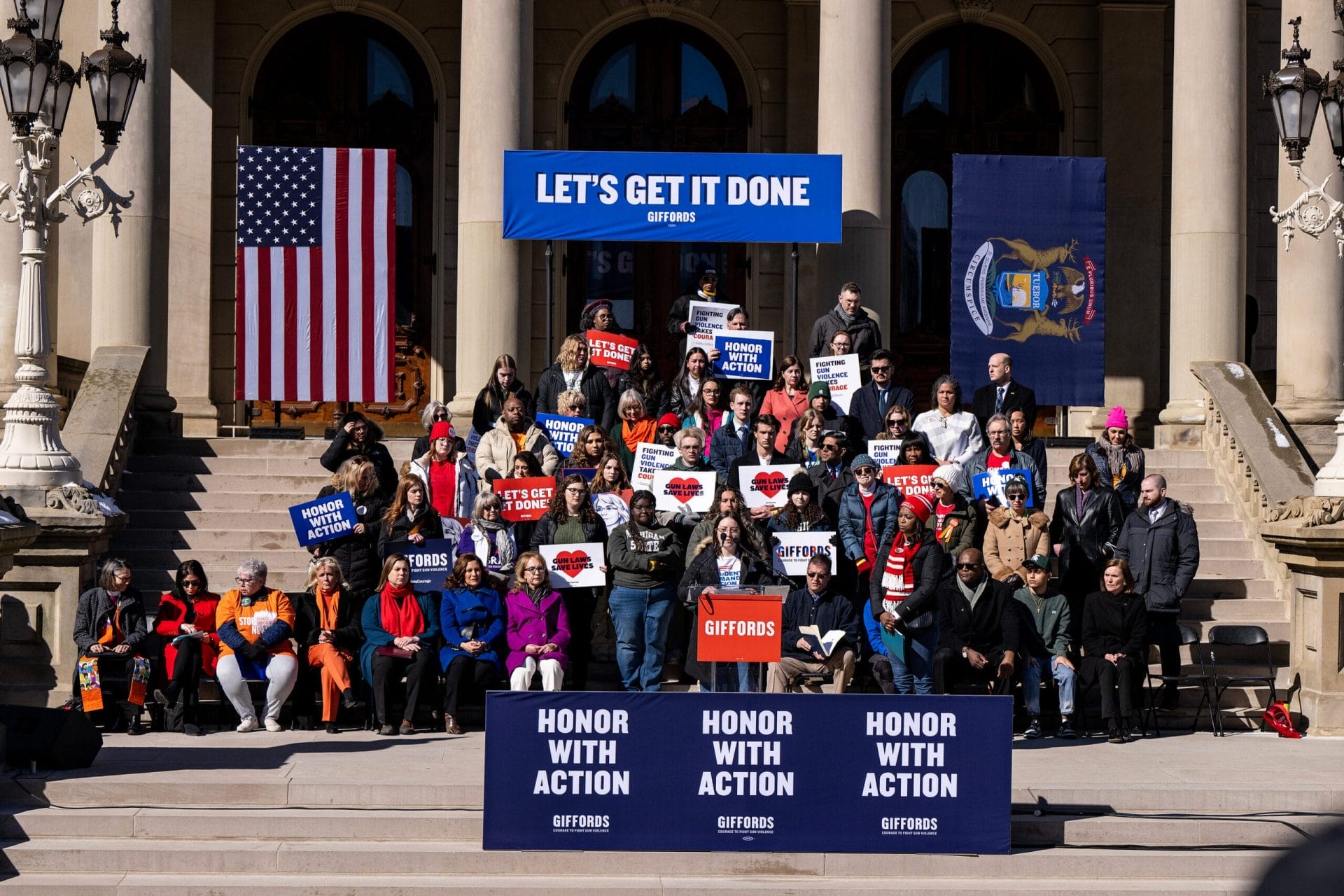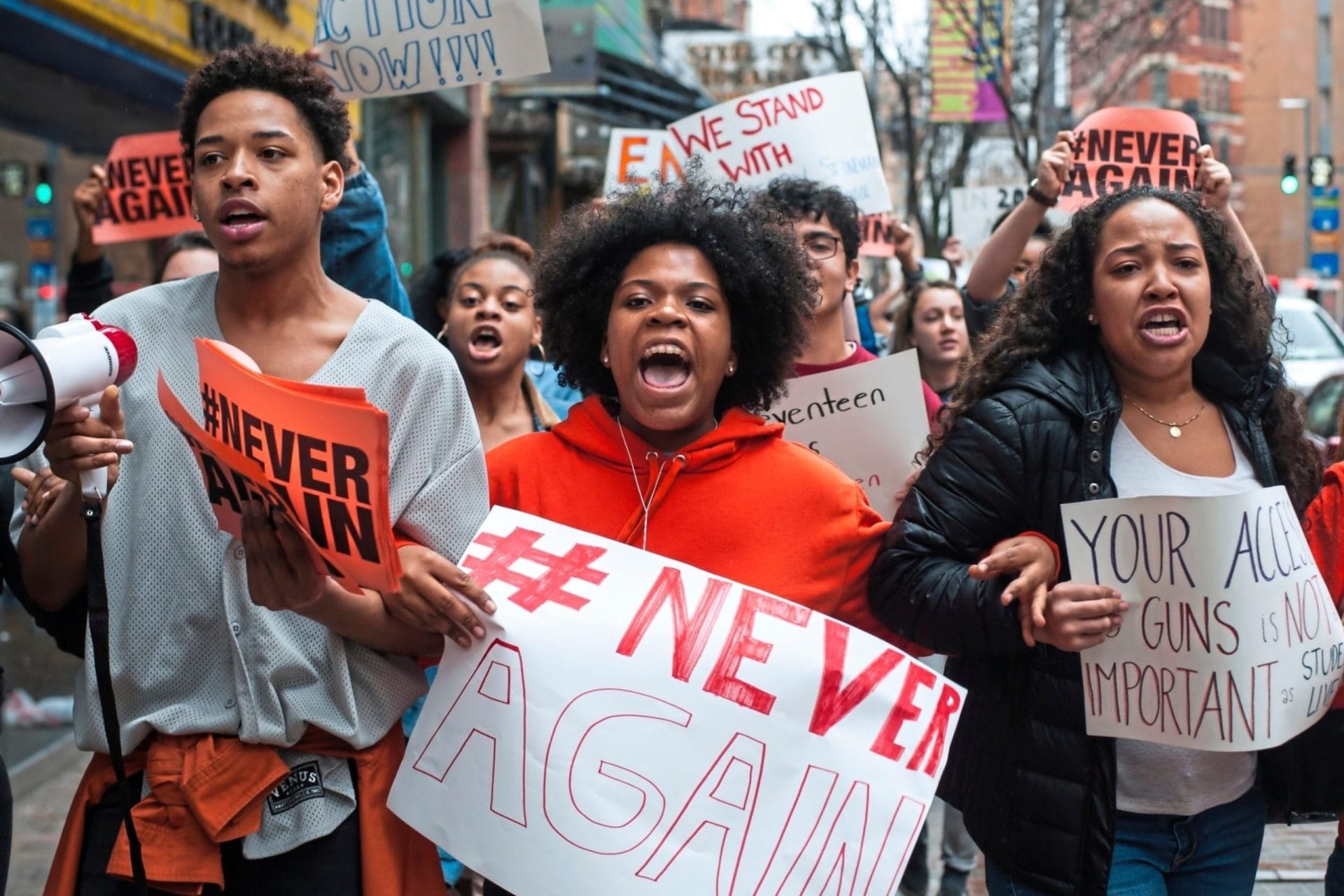
Giffords Law Center Gun Law Trendwatch: 2023 Year-End Review
A Roundup and Analysis of the Year’s State Firearm Legislation
Last year, in the case NYSRPA v. Bruen, the Supreme Court issued a radical new interpretation of the Second Amendment that forced several high population states to weaken their concealed carry laws in ways that have been shown to increase violent crime and gun violence.
The decision also invited an avalanche of lawsuits challenging gun laws, including effective and popular policies like the federal law that prohibits people subject to domestic violence restraining orders from having guns. This year, as states struggled with the fallout of the Bruen decision, the Court agreed to hear another Second Amendment case, US v Rahimi: the Fifth Circuit decision that struck down the aforementioned restraining order prohibition. It should announce its pivotal decision in this case next year.
Despite the challenges they faced—stemming from Bruen and right-wing extremism, among other things—states refused to relent in their efforts to enact proven solutions to gun violence.
This year, several states strengthened their concealed and open carry laws to mitigate the harms of the Bruen decision and prohibit guns at many sensitive locations where firearms pose even greater risks to public safety. Following the prominent display of guns being used to harass and intimidate election workers and legislators in 2020, many states continued to pass laws aimed at protecting democracy from armed intimidation, including prohibiting guns at polling places, government buildings, and other locations sensitive to the exercise of democracy.
This year also saw novel advances in gun safety efforts. California, frequently leading the country with innovative gun safety policies, passed a historic tax on gun and ammunition sales that is expected to generate nearly $160 million annually for gun violence prevention in the state. It also became the first state in the nation to require the use of a firearm merchant category code to help identify people who might be buying firearms and ammunition with credit cards to commit mass violence.
In 2023, voters proved that when they’ve had enough with the status quo of ignoring gun violence and instead want evidence-based, effective gun laws, they can make it happen. Michigan and Minnesota, both of which elected a slate of gun safety champions to their legislatures in 2022, led the way and passed universal gun licensing background checks, extreme risk protection orders, funding for community violence intervention programs, and several other proven gun safety policies.
As gun homicides continue to drop in major cities from their recent height during the pandemic, the future is bright for next year. States are poised to protect the 2024 presidential election from armed intimidation, enact victims’ access to justice bills, and continue to innovate ways to reduce gun violence.
2024 is another opportunity for lawmakers to take meaningful action to stop gun violence. This progress must continue—lives are at stake.
MEDIA REQUESTS
Our experts can speak to the full spectrum of gun violence prevention issues. Have a question? Email us at media@giffords.org.
Contact
In 2023, 25 states and Washington DC passed 103 strong bills, bringing the total number of significant laws passed since the massacre in Parkland in 2018 to 382. States have passed more than 620 laws since the mass slaughter of elementary students and educators at Sandy Hook Elementary in 2012.
Assault Weapons
Illinois (HB 5471) banned assault weapons. Washington (HB 1240) banned the sale but not possession of assault weapons. Connecticut (HB 6667) banned additional types of assault weapons.
Background Checks and Licensing
Michigan (HB 4138 and HB 4142) and Minnesota (SB 2909) closed the private sale loophole by requiring all or most people purchasing firearms to get a license and background check. California (AB 1406), Connecticut (SB 973), Minnesota (SB 2909), and Nevada (SB 367) strengthened the background check process.
Child Access Prevention/Safe Storage
Michigan (SB 79), New Mexico (HB 9), and Vermont (HB 230) enacted laws that make adults liable when they leave firearms accessible to minors. Connecticut (HB 6667) and Maryland (SB 858) strengthened their existing laws. Hawaii (SB 1230) required the safe storage of firearms in unattended vehicles. Nevada (SB 294) required locking devices to be sold with firearms purchased from a dealer.
Community Violence Intervention Programing
California (AB 28) enacted a historic tax on firearms and ammunition sales that is expected to generate nearly $160 million annually to fund gun violence intervention and prevention programs. California enacted two other pieces of legislation to fund community violence intervention (CVI) programs (AB 762 and SB 104). Several other states also funded CVI programs or strengthened CVI efforts, including Colorado (SB 2 and SB 241), Connecticut (HB 6941, HB 6942, and SB 1162), Delaware (HB 195), Illinois (HB 969 and SB 250), Maryland (HB 200), Massachusetts (HB 3901 and HB 4040), Michigan (HB 4016 and HB 4437), Minnesota (HB 1938, SB 2934, SB 2909, and SB 3307), New Jersey (AB 4978 and AB 5669), New Mexico (HB 68), New York (AB 3003 and SB 580), Oregon (SB 5506), Pennsylvania (HB 611), Vermont (SB 4 and HB 494), Virginia (HB 1400), Washington (SB 5187), and the District of Columbia (B 75, B 202, B 203, and B 320).
Regulating Guns in Public
California (SB 2), Hawaii (SB 1230), and Maryland (HB 824) strengthened the criteria to get a concealed carry permit. Connecticut (HB 6667) banned open carry. Hawaii (SB 1230) required people who wish to carry openly to obtain a license, background check, and safety training. Hawaii (SB 1230) and Maryland (SB 1) prohibited guns on all forms of private property without express permission.
Dealer Regulation
California required gun dealers to undergo annual training (SB 241), revised the notices and warnings dealers must post (SB 417), strengthened the process to inspect gun dealers (AB 1420), and prohibited dealers from offering firearms as prizes (SB 368). Connecticut (HB 6667) strengthened regulations of gun dealers, and Vermont improved dealer notice and warning requirements (HB 230).
Democracy
California (SB 2), Hawaii (SB 1230), and Maryland (SB 1) prohibited guns in government buildings. These same bills and Delaware (HB 202) prohibited guns in polling locations, and California and Delaware extended these prohibitions to ballot drop boxes. California, Delaware, and Maryland also prohibited guns where votes are being counted. California and Hawaii banned guns at protests and rallies. Oregon (HB 2572) and Vermont (SB 3) took steps to curb dangerous paramilitary activity. Michigan (HB 4129) prohibited the intimidation of election officials and behavior that prevents them from performing their duties.
Domestic Violence
Michigan (SB 471) prohibited people convicted of domestic violence misdemeanors, including dating partners, from possessing firearms. California (SB 599 and AB 818), Connecticut (HB 6667), Maryland (HB 824), Michigan (HB 4138), Utah (HB 199, HB 225, and HB 485), Vermont (SB 4), and Washington (HB 1562, HB 1715, and HB 5231) enacted laws to make it harder for people who commit domestic violence to access guns.
Extreme Risk Protection Orders
Michigan (SB 83) and Minnesota (SB 2909) enacted extreme risk protection orders that allow law enforcement officers or concerned family members to petition a court for a temporary order preventing a person in crisis from accessing guns. Colorado (SB 170), Connecticut (HB 6877), Vermont (HB 230), and Washington (SB 5231) strengthened existing laws.
Firearm Relinquishment
California (AB 732, AB 103, and AB 818) and Washington (SB 5231) all took steps to improve the process to disarm people who become prohibited from possessing firearms.
Ghost Guns
Oregon (HB 2005) banned ghost guns while California (AB 1089), Colorado (SB 279), Connecticut (HB 6667), and the District of Columbia (B 760) strengthened existing laws.
Gun Trafficking
California (AB 1483) and Connecticut (HB 6667) made it harder for people to buy firearms in bulk. Maine (SB 14), New Mexico (HB 306), and Vermont (SB 4) enacted laws to prevent trafficking and straw purchasing. New Jersey made individuals strictly liable for firearm trafficking that results in injury or death (SB 3150).
Minimum Age
Colorado (SB 169) raised the age to purchase or possess firearms to 21. Connecticut (HB 6667) also raised the age to purchase certain semiautomatic rifles to 21.
Prohibited People
California (SB 368), Maryland (HB 824), Vermont (SB 4), and Washington (HB 1562) prohibited gun possession for expanded categories of people who are at high risk of committing violence.
Records Reporting
Alabama (SB 158), Indiana (SB 136), and Vermont (SB 4) improved efforts to report records of prohibited people to state and federal databases.
Sensitive Locations
Delaware (HB 201) eliminated a concealed carry exemption for guns in K–12 schools. Hawaii (SB 1230) prohibited guns on the campuses of K–12 schools and, along with Maryland (SB 1), on the campuses of colleges and universities. California (SB 2), Connecticut (HB 6667), Hawaii (SB 1230), Maryland (SB 1) prohibited guns in locations where the presence of a firearm poses an even greater risk to public safety, children, or the exercise of constitutional rights.
Suicide Prevention
Montana (SB 423) created a voluntary process that allows an individual in crisis to give their guns to another person or entity for safekeeping. Utah (HB 300) updated the lists that individuals can voluntarily add themselves to to prevent them from purchasing a firearm. Washington (SB 5006) made a change to its voluntary “do not sell” list process by allowing a person to name a loved one to be contacted if the person tries to purchase a firearm.
Trigger Activators
Indiana (HB 1365), Louisiana (HB 331), and Utah (HB 304) banned trigger activators. Minnesota (SB 2909) strengthened its definition of trigger activators.
Victims’ Access to Justice
Colorado (SB 168), Hawaii (HB 426), Illinois (HB 218), and Washington (SB 5078) enacted laws that make it easier for victims of gun violence to sue the gun industry in spite of a federal law that gives gun dealers sweeping immunity from civil lawsuits.
Waiting Periods
Colorado (HB 1219) and Vermont (HB 230) enacted a three-day waiting period on firearm purchases, and Washington (HB 1143) created a 10-day waiting period. Minnesota (SB 2909) extended the waiting period when a purchaser buys a handgun or assault weapon to 30 days.
Other Gun Safety Laws
California
Appropriated $21,000,000 for a gun buyback program (AB 102). Required individuals to report the loss or theft of completed and unfinished firearm frames and receivers (AB 725). Required the California attorney general to provide specific information to local law enforcement agencies about prohibited people in their jurisdictions (AB 303). Required gun manufacturers to incorporate microstamping technology into handguns (AB 452).
Allocated a total of $4 million to the University of California Firearms Violence Research Center (AB 102, AB 103, SB 101, SB 103, and SB 142). Appropriated $40,000,000 to the Judicial Council (the administrative body of the courts) to support a court-based firearm relinquishment program (AB 103). Required entities to use a firearm merchant category code for firearms and ammunition purchases (AB 1587). Required information about the benefits and risks of owning a firearm and bringing a firearm into the home to be included in the mandatory Firearms Safety Training Test (AB 1598).
Washington
Required firearm safety training to purchase a firearm (HB 1143).
Anti-ESG Investing
Alabama (SB 261), Arkansas (SB 62 and HB 1307), Idaho (HB 190), Kansas (HB 2100), Montana (HB 356), North Dakota (HB 1429), and Utah (HB 449 and SB 97) prohibited localities, state entities, or financial institutions from entering into contracts with or divesting from companies who have taken action to divest from certain gun industry members to motivate more responsible corporate behavior. Indiana (HB 1008) required the Board of Trustees of the public retirement system to fire investment managers who divest assets from the firearms industry for non-financial reasons. North Dakota (HB 1429) also prohibited insurance companies from making rate decisions using environmental, social, and governance (ESG) criteria.
Banning Law Enforcement from Enforcing Federal Gun Laws
Kentucky (HB 153) passed a law that makes law enforcement officers and other public officials criminally liable for helping to enforce federal gun laws. Mississippi (HB 912), Utah (HB 219), and West Virginia (HB 3354) passed laws stating that federal gun laws are unenforceable in their states.
Gun Industry Immunity
Montana (HB 584), Tennessee (HB 1189), and Wyoming (SB 116) enacted policies making it more difficult to sue reckless gun industry members under state law.
Guns Everywhere
Arkansas (SB 211) repealed a law that prohibited guns on Department of Transportation property and (HB 1737) incentivized private property owners to allow guns on their properties by limiting their liability for doing so.
Permitless Carry and Expanded Concealed Carry
Florida (HB 543) and Nebraska (LB 77) repealed their laws that required a person to get a permit, background check, and safety training before carrying a concealed, loaded firearm in public. North Dakota (HB 1339) removed the requirement that a person who carries permitless must be a resident of the state. Louisiana (HB 446) made it easier for someone with DUI convictions to carry a concealed firearm. Montana (HB 674) created a process to allow 18 to 20-year-olds to carry concealed firearms in public and lengthened the duration of a concealed carry permit (SB 400).
Preemption
North Dakota (HB 1340), Nebraska (LB 77), Texas (HB 3137), and West Virginia (HB 3354) made it harder for local communities to prevent gun violence.
Registration
Mississippi (HB 1110) and North Dakota (HB 1487) prohibited governmental entities from keeping lists of firearm owners.
Schools and Campuses
Mississippi (SB 2079) allowed teachers to carry firearms in K–12 schools. West Virginia (SB 10) allowed concealed carry of firearms on campuses of higher education. Texas (HB 3) required armed security on the campuses of K–12 schools and allowed school employees to carry under certain circumstances.
Undermining Corporate Responsibility
West Virginia (HB 2004), Florida (HB 3 and SB 214), Idaho (HB 295), Mississippi (HB 1110), Montana (SB 359), North Dakota (HB 1487), and Texas (HB 2837) prohibited financial institutions or credit card companies from using a merchant code to identify firearms purchasers or engaging in corporate acts aimed at preventing gun violence.
Other Dangerous Laws
North Carolina (SB 41) repealed its permit to purchase background checks law.
Montana (HB 631) required courts to apply “strict scrutiny”—the highest civil legal standard—in gun law cases, undoubtedly ensuring an onslaught of challenges to criminal convictions involving firearms in Montana.
Utah (HB 120) made it easier for people who have committed domestic abuse to possess firearms.
Permitless Carry
This year, bills to allow individuals to carry concealed, loaded firearms without a permit, background check, or safety training failed in Colorado, Maryland, New Mexico, Oregon, and Virginia.
Guns on Campus
Bills to allow or expand guns on the campuses of higher education failed in Arizona, Idaho, Kentucky, Mississippi, Nevada, North Dakota, Oregon, and Wyoming.
Guns in K–12 Schools
Despite the evidence that gun access leads to gun violence and, therefore, guns in schools will increase shootings not prevent them, legislators friendly to the gun industry predictably call for laws arming teachers and other civilians. This year, bills to allow guns in K–12 schools failed in Arizona, Kentucky, Maine, Missouri, Nevada, Oregon, and Wyoming.
Making Police Liable for Enforcing Federal Gun Laws
Bills that would have made law enforcement officers or other government officials personally liable for criminal or civil penalties for helping to enforce federal gun laws were defeated in Colorado, Indiana, Louisiana, Mississippi, New Hampshire, South Dakota, Texas, West Virginia, and Wyoming.

TAKE ACTION
Students, veterans, survivors: Americans from all walks of life across the country are standing up for commonsense gun reform. If you’re fed up with politicians who care more about protecting gun lobby profits than your safety, stand with us in this fight.
Join Us
